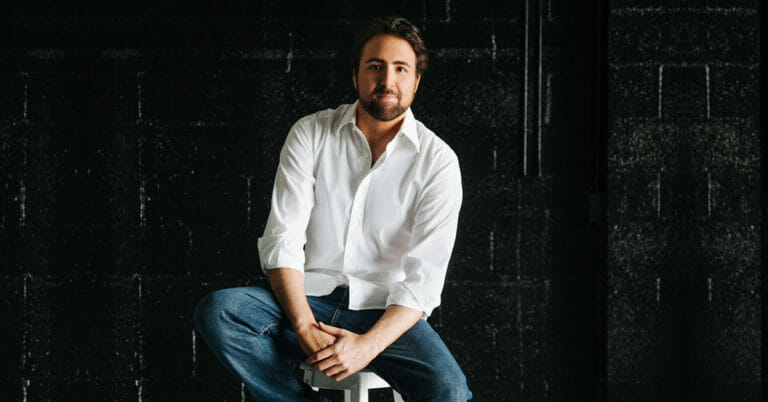By Valerie Kalfrin · June 13, 2019

Writer, producer, and director Bert Marcus has an ear for a good story with broad appeal, something he credits both to his college radio days and an open outlook.
Marcus, of Bert Marcus Productions and Bert Marcus Film, discovered that documentaries were an accessible, low-budget way to tell “socially impactful stories through an entertaining lens,” thanks to being a producer on the 2010 documentary Teenage Paparazzo, directed by Adrian Grenier (Entourage).
Since then, Marcus has become known for the documentaries Champs (2014), about boxing greats Mike Tyson, Evander Holyfield, and Bernard Hopkins in and out of the ring, and What We Started (2017), about the history of electronic dance music. His latest documentary, The American Meme (2018), about social media influencers and provocateurs like Paris Hilton and Josh Ostrovsky, is now streaming on Netflix.
Marcus also is venturing into drama as a producer of the films Bull, which premiered at this year’s Cannes Film Festival, and Human Capital, in post-production. Based on the novel by Stephen Amidon, it stars Marisa Tomei, Liev Schreiber, and Peter Sarsgaard.
He recently spoke with The Filmmakers Podcast, sponsored by The Tracking Board, to chat with host Giles Alderson, where he offered these insights about finding your inspiration and earning your subjects’ trust. Listen to the entire podcast below.
Learn to, subscribe and learn more about The Filmmakers Podcast here.
Marcus likes to choose projects that intrigue him in an organic way. “So many things have been explored and exhausted … even ones that I’ve done, and I think the idea is, How do you have your unique, original take on it? And how are you going to execute it in a way that’s going to throw the audience for a loop and really be fascinating?”
He pitches investors on the concept, or subject matter, and the characters or interview subjects that he’ll use to explore the concept. “I definitely don’t know how it’s going to play out, and how it plays out is real. I think that’s what makes the films special.”
Champs, which heavyweight champion Tyson and his wife, Kiki Tyson, also produced, evolved from Marcus knowing the couple a bit and wanting to offer a sociological view of the boxing industry.
“It was, ‘How do we see this idea of a fighter and what they go through?’ and the fact that fighting is the one thing that saves their life, but it’s also the thing that ends up ruining their life,” he said. “These guys have such fascinating stories … Mike Tyson, Evander Holyfield, and Bernard Hopkins—three guys that came up at the exact same time—got involved in boxing for completely different reasons and different ways and have completely different trajectories, and the outcomes were completely different.”
With The American Meme, of which Paris Hilton is an executive producer, Marcus had no personal connection with the subjects beforehand, just curiosity about the phenomenon of lives lived on social media. Celebrities DJ Khaled, Emily Ratajkowski, Hailey Bieber, Dane Cook, and Tommy Lee also appear in the film.
“I knew I wanted to spark a dialogue on the consequences of this infatuation with social media and complicated questions that arise in the intersection of real life versus online presence,” he said. “At the most fundamental level, it all comes down to the basic condition that we can all identify with, which is the urge and the desire to be loved. … And also, hopefully, it’s an eye-opener of where we’re at in society and how we all play such a pivotal role in this.”
Marcus might have a concept or general thesis in mind, but he likes approaching the topic and the people he’d like to interview without preconceived notions. It’s important to him to get material that’s fresh, not something a viewer could Google.
If a point of view or angle changes during the filmmaking process, “I want it to play out naturally within the film and for the audience. For our films, one of the most important things to me is making sure the audience can make their own decisions and we aren’t coming in with such harsh judgments beforehand. So I try to choose subject matters I don’t even know that much about to begin with, because I like to really explore them and not impose my canon on everybody. I like to share what I’ve learned with everybody … but ultimately, I want the audience to realize how it impacts them.”
He builds this receptive environment through multiple meetings and interviews, some before turning on the cameras. “I like to have a few interviews to establish that trust with the characters and have them understand, you know, this is how we’re looking [at] this topic, and we want to be real, and we want it to resonate with people and all walks of life,” he said.
That might be as simple as having coffee several times in advance. “I want it to be unique and original, and the only way to do that is to really meet your subjects and be able to spend time with them and really create that rapport with them before the cameras even turn on,” he said. “I don’t like making movies that have talking heads; for me as a filmmaker, the most important thing is creating those experiences for people where they’re able to watch a film and be immersed in this world.”
3. Believe in your story and yourself.
Marcus said he knows this sounds clichéd, but passion is contagious. “Whether it’s investors or talent or distributors on board on your project, if they sense that passion from the filmmaker, it’s contagious, and they automatically get passionate about it.”
Even so, you also have to be tenacious, because even with passion behind a project, some naysayers won’t believe in what you’re doing until it’s onscreen.
“To me, tenacity is what really separates people who are able to get their films out there,” he said. “You just have to be the one to really believe in it because no one’s going to believe in it for you. No one really believes until they see it.”
 Valerie Kalfrin is an award-winning crime journalist who now dives into fictional mayhem as an author (Quicklet on The Closer: Season 1), essayist, film critic, screenwriter, and emerging script consultant. She also writes for The Guardian, Bright Wall Dark Room, ScreenCraft, Hazlitt, Signature, and the blog for Final Draft, the top-rated screenwriting software used by the filmmaking industry. A member of Screenwriters of Tomorrow, she’s collaborated on short films and features, and she’s affiliated with the Tampa Bay Film Society. She lives in Florida. Find her online at valeriekalfrin.com.
Valerie Kalfrin is an award-winning crime journalist who now dives into fictional mayhem as an author (Quicklet on The Closer: Season 1), essayist, film critic, screenwriter, and emerging script consultant. She also writes for The Guardian, Bright Wall Dark Room, ScreenCraft, Hazlitt, Signature, and the blog for Final Draft, the top-rated screenwriting software used by the filmmaking industry. A member of Screenwriters of Tomorrow, she’s collaborated on short films and features, and she’s affiliated with the Tampa Bay Film Society. She lives in Florida. Find her online at valeriekalfrin.com.
Photo credit: Remix Magazine
For all the latest from The Script Lab, be sure to follow us on Twitter, Facebook, and Instagram.